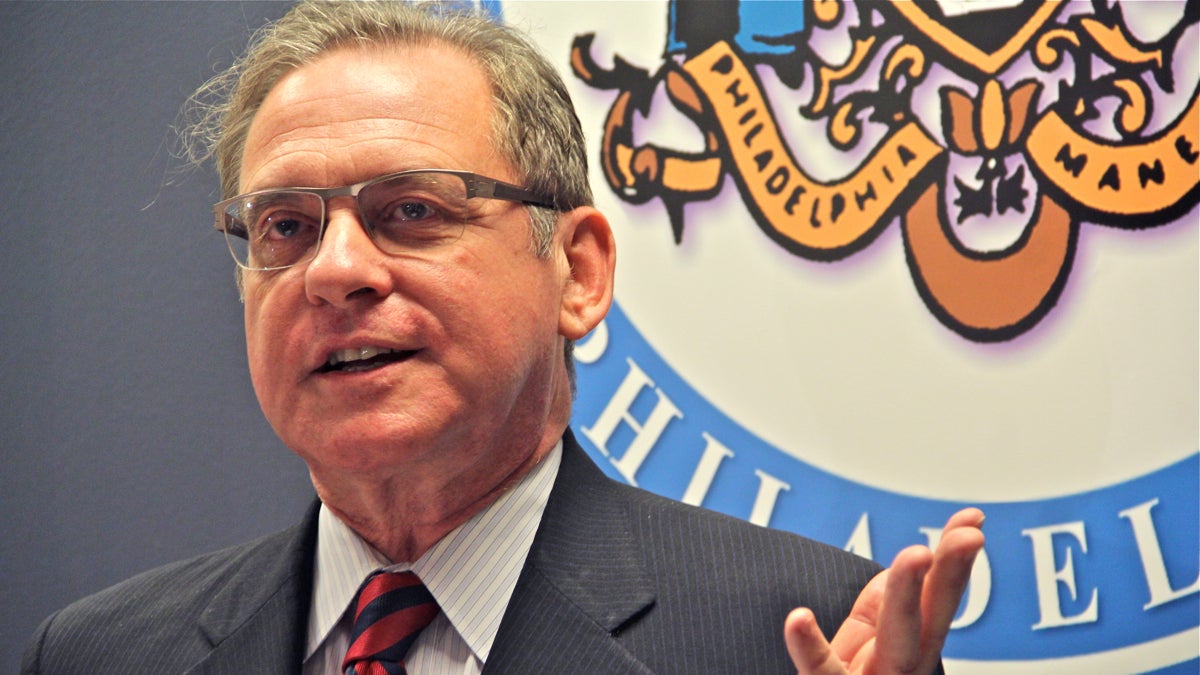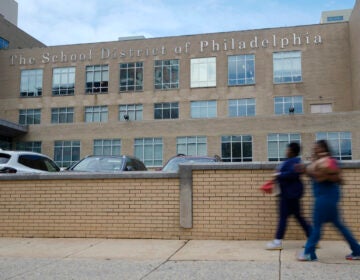Audit of Philly schools finds familiar flaws

Philadelphia City Controller Alan Butkovitz is seeking his fourth term. (Emma Lee/WHYY)
The School District of Philadelphia owes $6.5 million to former employees and needs to tighten its oversight of student activity funds and student TransPasses, according to an audit released Wednesday by City Controller Alan Butkovitz.
The findings largely mirrored those of last year’s audit, which found the district “holding over $5 million in unclaimed compensation” and also pointed to potential problems with TransPasses and student activity funds.
The unpaid $6.5 million is owed to 2,544 former employees, some of whom left the district as far back as 2001. Departing employees are supposed to receive compensation for any unused leave within 75 days of leaving the district, according to the audit. The Controller’s office says the district doesn’t have the necessary staff to dispense termination pay in a “timely manner.” It also claimed the district’s failure to pay likely violates labor agreements.
In its official response to the audit, the district acknowledged its payroll department lacks the bodies to meet its obligations. The district attributed its staffing shortage to “chronic financial underfunding,” but said it added a full-time employee last month to help churn through the back log.
Uri Monson, the district’s finance chief, said Wednesday the lag time stemmed largely from drastic cuts the district has made over the last five years to combat budget woes. Those cuts meant the district had more pay outs it needed to catalog, but less central staff available to do the cataloging.
“You have half as many people processing this and triple the volume,” Monson said.
With the addition of a new staffer, Monson expects to make significant progress on termination pay this year and acknowledged that ongoing payment woes are a significant problem.
“This is the right thing to do,” said Monson. “These are funds people are entitled to and we should be getting it to them.”
The audit also examined student TransPass activity at five high schools in March 2015 and found school employees couldn’t account for more than 200 of them. Together those passes were worth about $3,700. The district spends nearly $33 million on its Student TransPass Program.
The auditor said school administrators weren’t following proper procedure when distributing the passes. The report also recommended requiring individual students to sign for receipt of their TransPasses.
The district, however, is wary of committing too many resources to the problem since SEPTA is in the middle of converting to a smart card system.
“We don’t want to do too much on an out-of-date system,” Monson said.
On the issue of student activity funds (SAFs), the city controller found poor compliance with existing procedures that could expose roughly $5 million to fraud and abuse. SAFs consist of money collected from individual students and are supposed to be use for educational activities. The report found many SAFs didn’t use proper bidding procedures and that school principals hadn’t established “required finance committees” to oversee SAF accounts.
Other issues highlighted in the audit included:
The inability of principals at select schools to account for high-value equipment such as refrigerators and projectors;
A slight uptick in the number of employees whose payroll was not properly approved by district administrators;
Nearly $40,000 in petty cash unaccounted for.
In its official response, the district largely agreed with the controller’s findings. It said it is in the process of reviewing and closing its many petty cash accounts.
“I think most of the issues they pointed out are areas we’re working on,” Monson said.
Monson did, however, dispute the tenor of the Controller’s report when it came to the missing equipment.
The audit found $65,000 worth of equipment that “could not be located or were presumed missing.” Monson said that number was based on the original value of the items in question, even though some were decades old. He also noted that $65,000 represents a small fraction of the district’s total personal property assets.
“That represents less than three tenths of one percent of our personal property assets,” said Monson. “In the great scheme of things, if we’re 99.7 percent good I actually think you should be commending us for that, not criticizing us.”
Butkovitz also used the occasion of Wednesday’s release to revive an old call for increased auditing power. The City Controller’s office can review district financial statements, but cannot dive deep into district records to look for inefficiences. Butkovitz says his office could find millions in savings, potentially helping the district navigate its long-term, structural deficit.
“I urge the Mayor along with City Council to work with the School District to establish a Memorandum of Understanding that would allow more oversight of our education dollars,” said Butkovitz in a statement. “Our Office has the necessary knowledge to navigate their financial records. We just need the authorization to cut through the red tape and inspect all of the pages in their books.”
Butkovitz also wants the district to establish a five-year budget that is reviewed regularly by an independent agency.
Monson said it was “always important to get outside feedback,” but noted that the school district already undergoes audits conducted by the state, the U.S. Department of Education, and the U.S. Office of the Inspector General. Among those audits, the City Controller’s is the only one that costs the school district money (about $400,000, Monson said).
If the City Controller wants to extend its auditing authority, Monson said, the district would have to know what it was paying for–and to make sure those angles aren’t already covered by another audit.
“Dollars are finite,” Monson said.
This story has been updated with a response from Uri Monson, Chief Financial Officers of the School District of Philadelphia.
WHYY is your source for fact-based, in-depth journalism and information. As a nonprofit organization, we rely on financial support from readers like you. Please give today.





